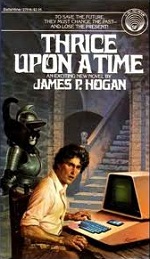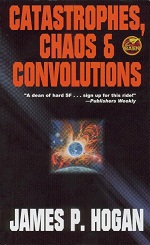Novel
Thrice Upon a Time
- by James P. Hogan
- (Del Rey, March 1980)
In answer to his least favorite question, James Hogan explained (in the Jan 2006 Analog) that the idea for this novel came from an all night conversation with Charles Sheffield about the classic time-travel paradox of what happens if you send something back in time and the arrival of that thing is the very cause of you not sending said thing back in time. Much of the novel is a similar conversation between physicist Murdoch Ross, his friend Lee, and Murdoch’s Nobel Prize winning grandfather Charles who has invented a way to send messages through time.
Suppose your grandfather’s right. What happens to free will? If you can send information backward through time, you can tell me what I did even before I get around to doing it. So suppose I choose not to?



